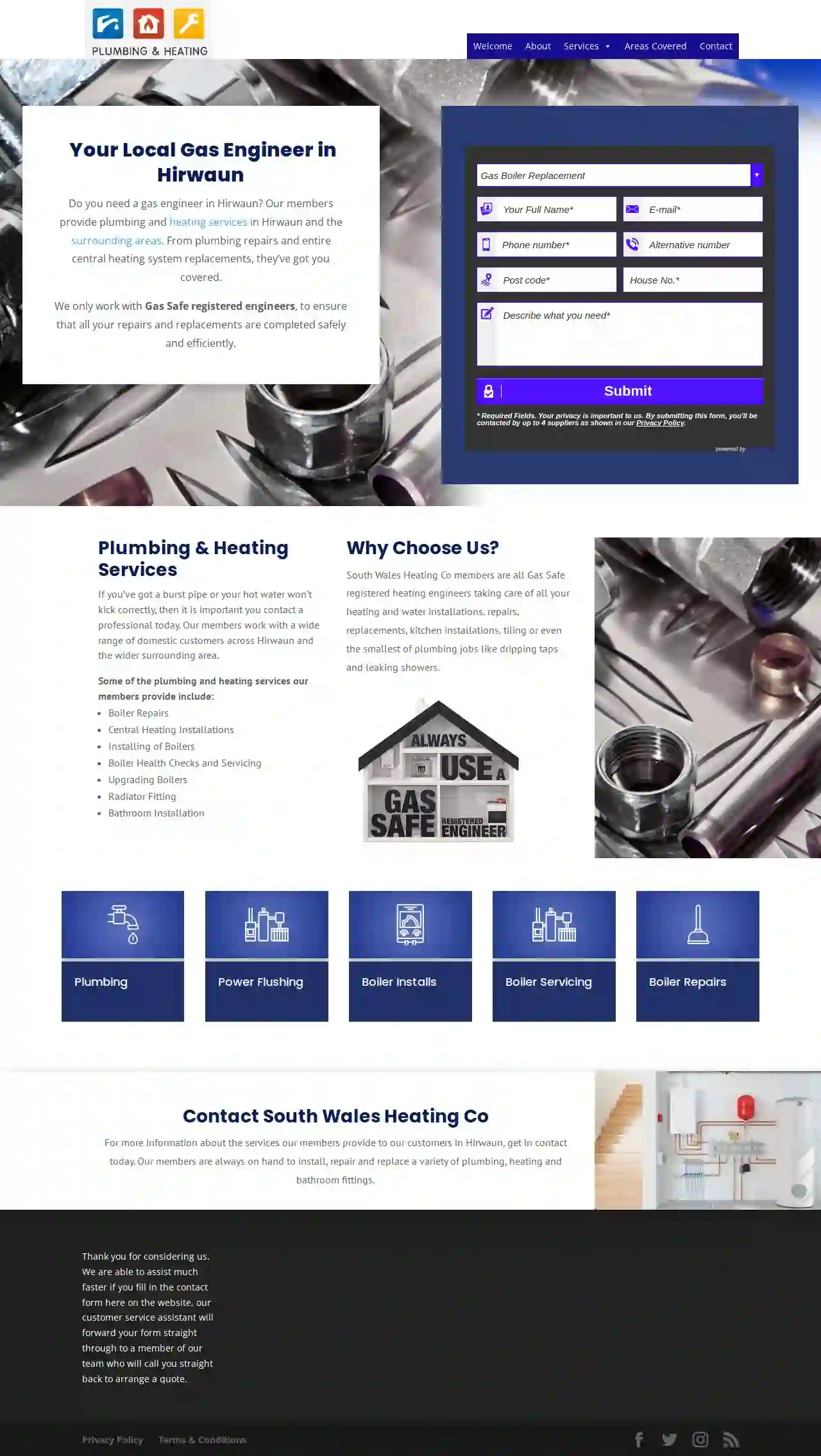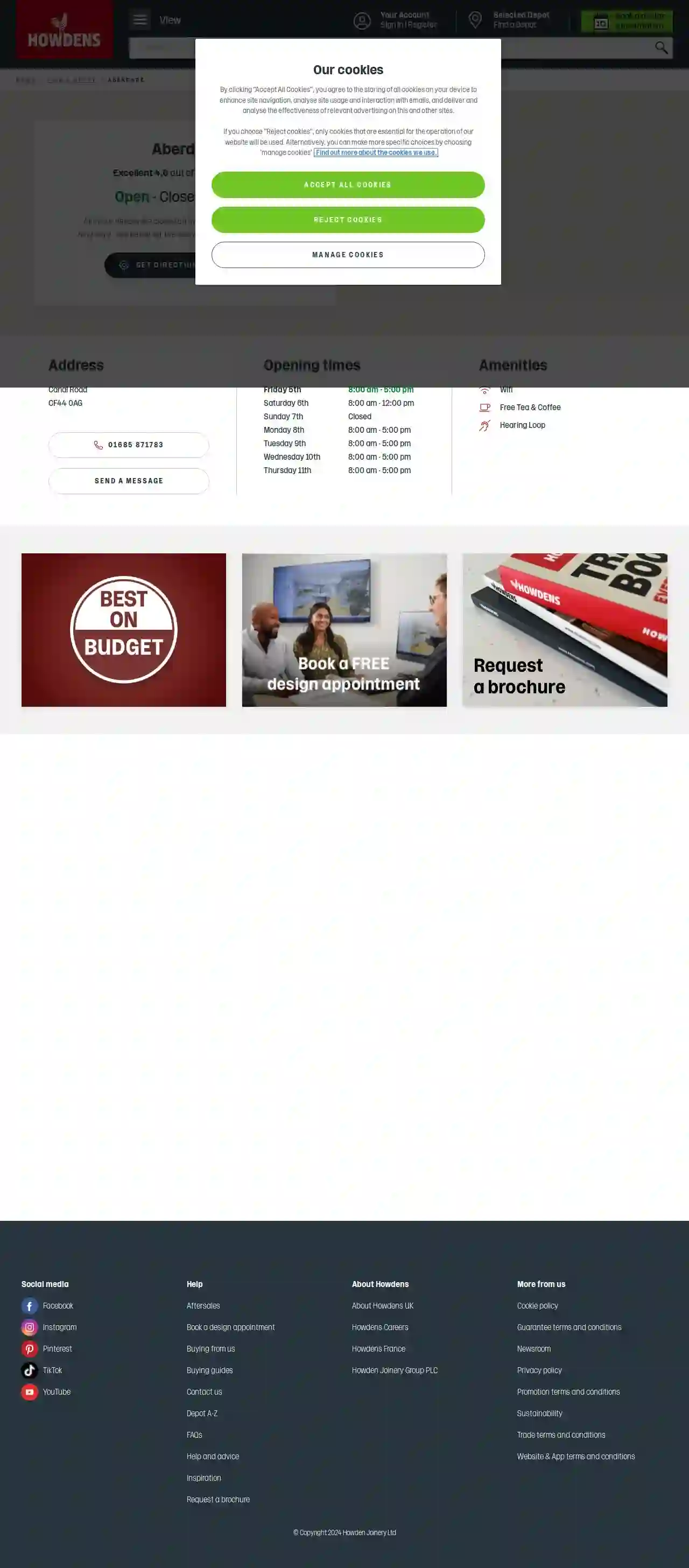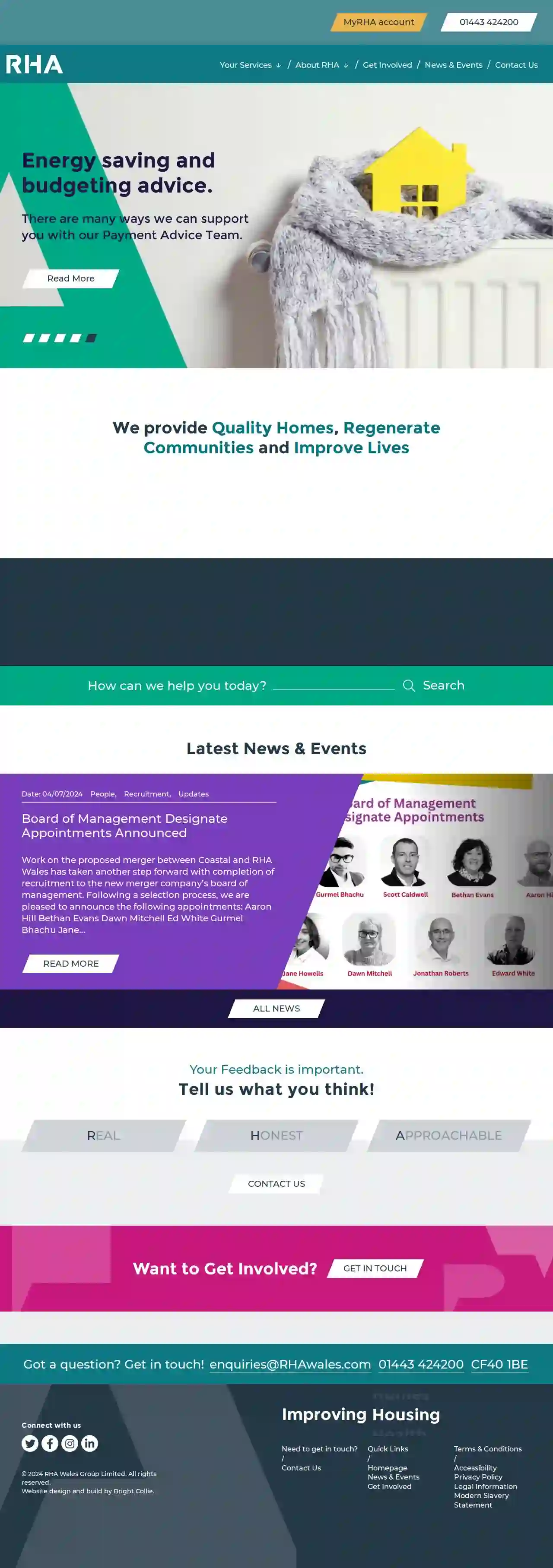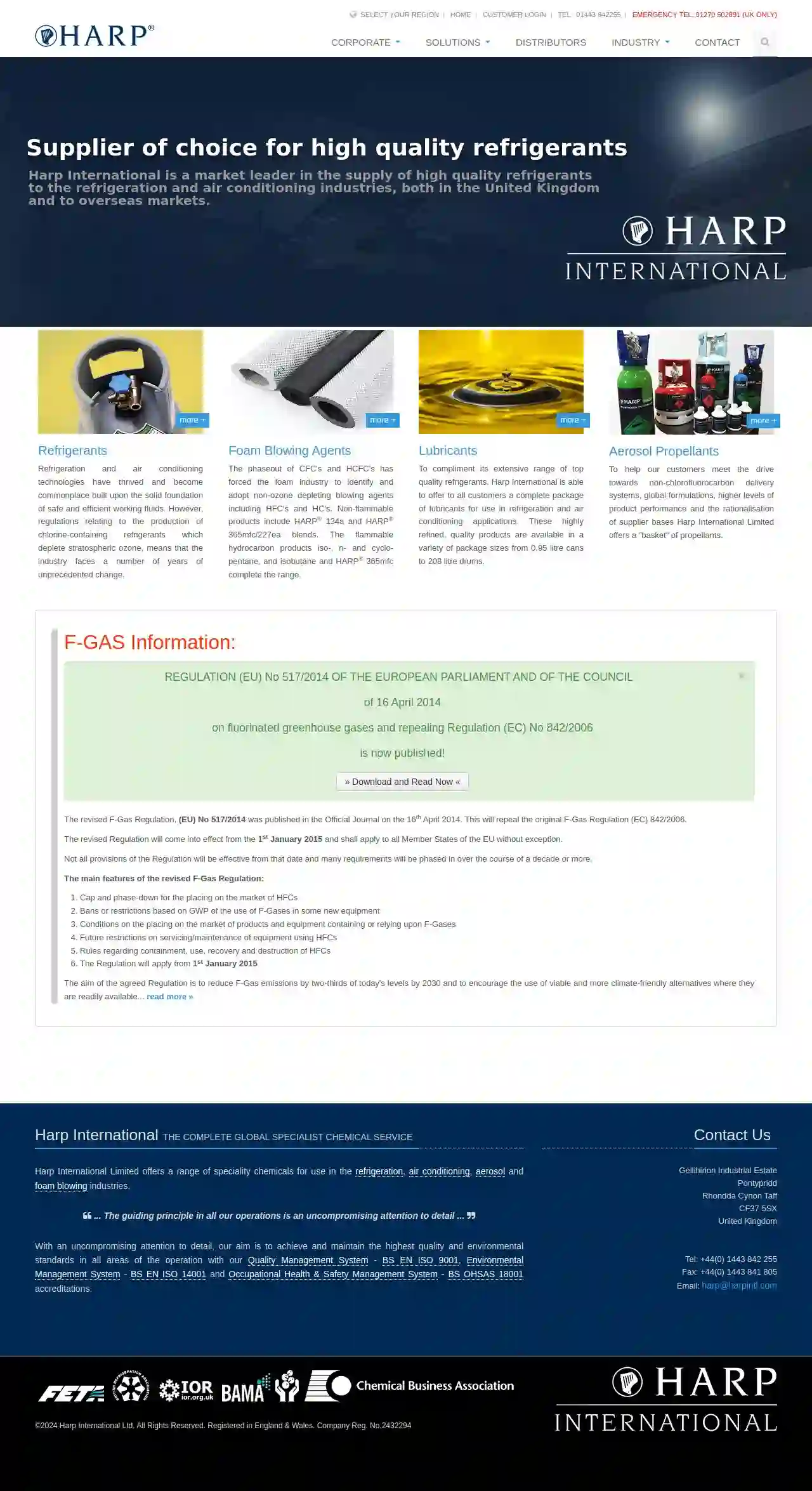HVAC Companies Brynna
Find the best HVAC Services in Brynna
Get 3 FREE HVAC Companies quotes for your project today! Compare profiles, reviews, accreditations, portfolio, etc... and choose the best deal.

lee sizer's plumbing and heating
11 reviewsAberdare, GBSouth Wales Heating Co is a network of Gas Safe registered heating engineers serving South Wales and the surrounding areas. They offer a comprehensive range of plumbing and heating services, from small repairs like dripping taps to large installations like central heating systems. Their team of experienced engineers is dedicated to providing safe, efficient, and reliable service to domestic customers. Whether you need a boiler repair, a new boiler installation, or help with your central heating, South Wales Heating Co can help.
- Services
- Why Us?
- Gallery
Get Quote
Howdens - Aberdare
4.651 reviewsAberdare, GBHowdens is the UK's Number 1 Trade Kitchen Supplier, operating in the UK, Republic of Ireland, France, and Belgium. With hundreds of depots nationwide, you are always within easy reach of a local Howdens, where you can talk to someone in person about your query. Our friendly and knowledgeable depot staff can help with a wide range of topics, from product information to fitting advice, account registrations, and design services, plus details about appliance registrations.
- Services
- Why Us?
- Accreditations
- Our Team
- Testimonials
- Gallery
Get Quote
Simon Rogers Gas Plumbing & Heating Services Ltd
4.714 reviewsAberdare, GB- Services
- Why Us?
- Gallery
Get Quote
N&S Air Conditioning
Marine Street, Unit 3 Cwm Small Business Centre, NP23 7TB, GBAt N&S Air Conditioning, we believe in providing top-quality HVAC services to our customers. Our team has over 50 years of combined experience in the industry and is committed to delivering excellent customer service. We offer a wide range of HVAC services including Air Conditioning, Ventilation, Refrigeration, Fire Dampers. Our team is trained to work on all major brands of equipment. We stand behind our work and offer a satisfaction guarantee on all of our services. We also offer an extended warranty ranging from 5-7 years with specific Manufacturers.
- Services
- Why Us?
- Gallery
Get Quote
Rhondda Housing Association
3.547 reviewsHigh Street, Pontypridd, The Little Shed, 10-12, CF40 1BE, GBRHA Wales is a leading housing association dedicated to providing quality homes and improving lives across Wales. We are committed to regenerating communities and creating thriving spaces where people can live, work, and grow. Our mission is to deliver exceptional customer service, build strong relationships with our tenants, and make a positive impact on the lives of the people we serve. With a rich history of providing affordable housing, RHA Wales has a proven track record of success. We have a dedicated team of professionals who are passionate about making a difference. Our expertise spans a wide range of areas, including: Rent and Housing Management: We offer a range of affordable rent options and provide comprehensive housing management services to ensure our tenants have a safe and comfortable place to call home. Repairs and Improvements: We are committed to maintaining our properties to a high standard and providing prompt and efficient repairs. We also invest in planned improvements to enhance the quality of our homes and communities. Advice and Support: We offer a range of advice and support services to help our tenants with issues such as budgeting, energy saving, and home safety. Community Engagement: We believe in working closely with our communities to understand their needs and deliver services that make a real difference. We actively engage with local residents, businesses, and organizations to create thriving and inclusive communities. At RHA Wales, we are committed to: Providing quality homes that meet the needs of our tenants. Delivering exceptional customer service. Regenerating communities and creating thriving spaces. Improving the lives of the people we serve.
- Services
- Why Us?
- Accreditations
- Gallery
Get Quote
Response Engineering Solutions Limited
4.56 reviewsHirwaun, Mid Glamorgan, Unit 8 & 9, Hirwaun Industrial Estate, CF44 9UP, GBWelcome to Response Engineering Solutions. Response Engineering Solutions Limited is a proactive mechanical and electrical engineering company. We operate within the UK’s wide range of material processing industries, including aggregates, asphalt, concrete, coal, steel-making, product warehousing, water treatment and ship-loading operations. We pride ourselves on our commitment to customer satisfaction through our flexibility and speed of action. Our focus is to provide a prompt, professional and effective response to our clients and prospective clients. Typical enquiries range from project tenders to the reactive emergency supply of site operatives for a breakdown situation and the supply, installation, and maintenance of specialist industrial plant and equipment. We are proud of our proactive approach to health & safety and our commitment to personnel training. Our vision is to be seen as the first point of contact for our customers’ mechanical & electrical engineering and maintenance requirements.
- Services
- Why Us?
- Gallery
Get Quote
Harp International Ltd
3.917 reviewsPontypridd, Rhondda Cynon Taff, Gellihirion Industrial Estate, CF37 5SX, GBHarp International is a market leader in the supply of high quality refrigerants to the refrigeration and air conditioning industries, both in the United Kingdom and to overseas markets. With an uncompromising attention to detail, our aim is to achieve and maintain the highest quality and environmental standards in all areas of the operation with our Quality Management System - BS EN ISO 9001, Environmental Management System - BS EN ISO 14001 and Occupational Health & Safety Management System - BS OHSAS 18001 accreditations.
- Services
- Why Us?
- Accreditations
- Gallery
Get Quote
Principality Windows Ltd
4.746 reviewsPontypridd, GBPrincipality Windows is a FENSA registered double glazing company with over 30 years of experience in installing windows, doors and conservatories. We are dedicated to providing a first-class professional service to the people of South Wales and surrounding areas. Our team of professional window fitters are committed to delivering high-quality products and services, whether it's a small job or a large project. We offer a wide range of uPVC and Aluminium windows, including Vertical Sliding (Box Sash), Casement, Bay, Tilt & Turn, Arched, Round and Angled windows. We also supply and install Composite Front, Back, Stable style, Patio, Bi-folding, and French doors. In addition to new installations, we also offer repairs and glass replacement services for existing windows and doors. At Principality Windows, we understand that choosing new windows and doors is a significant investment. That's why we strive to make the process as smooth as possible for our customers. From the initial consultation to the final installation, we are dedicated to providing expert advice, competitive pricing, and exceptional customer service. We pride ourselves on using only the best quality products from reputable manufacturers. All of our installations are covered by a 10-year insurance backed guarantee, giving you peace of mind knowing that your investment is protected. If you're looking for high-quality windows and doors in South Wales, look no further than Principality Windows. Contact us today for a free, no-obligation quote.
- Services
- Why Us?
- Accreditations
- Our Team
- Gallery
Get Quote
LH Evans Aberdare
41 reviewsOcean Way, Ocean Park, Cardiff, CF24 5HH, GBLH Evans is a family-run electrical wholesale business with over 60 years of experience serving customers across South Wales and the West. Founded in 1962 by Lynn Evans, the company has grown from humble beginnings on a Welsh farm to a multi-branch operation with a central warehouse and head office in Cardiff. LH Evans prides itself on its long-serving and knowledgeable staff, excellent same and next day delivery services, professional product knowledge, and outstanding customer service. They offer a wide range of electrical supplies and expert advice, with dedicated local sales teams ready to assist with any product questions or quotation requests. LH Evans also operates six convenient branches across South Wales and the West, open six days a week to both trade and the public. In addition to their core electrical wholesale business, LH Evans also offers a variety of lighting services, including luxury lighting showrooms and extensive commercial design services. For more information on their lighting showrooms, visit www.emalighting.co.uk. LH Evans is committed to responsible waste management and is a registered upper tier waste carrier with Natural Resources Wales. They also serve as an official Recolight Collection Point, ensuring the proper disposal of lamps.
- Services
- Why Us?
- Accreditations
- Gallery
Get Quote- Co
Cosy Stoves Solutions
53 reviews123 Main St, City Name, 12345, GBAt [Business Name], we are dedicated to providing exceptional [services] to our clients. With [number] years of experience, our team of experts is committed to delivering high-quality results that exceed our clients' expectations. Our mission is to [mission statement].
- Services
- Why Us?
- Accreditations
- Our Team
- Testimonials
- Gallery
Get Quote
Over 12,692+ HVAC Companies on our platform
Our HVAC experts operate in Brynna and surrounding areas!
HVACCompaniesHub has curated and vetted Top HVAC Businesses in Brynna. Find the most trustworthy pro today.
Frequently Asked Questions About HVAC Companies
- Climate: Heat pumps are generally more efficient in moderate climates, while furnaces are better for colder regions.
- Budget: The upfront cost of different systems can vary significantly.
- Energy Efficiency Goals: Higher-efficiency systems are usually more expensive upfront but result in lower energy bills over time.
- Home Size and Layout: The square footage and layout of your home affect the system's capacity and ductwork requirements.
- Existing Ductwork: If you have existing ductwork, you'll need a system compatible with it.
- What is the source of the problem? Get a clear explanation of the issue and what caused it.
- What are my repair options? Discuss different repair solutions, if applicable, and their associated costs.
- Are there any preventative measures I can take? Find out if there are steps you can take to prevent future problems.
- Do you recommend a repair or replacement? If repairs are extensive or the system is old, consider replacement.
- What are the warranties on parts and labor? Understand the warranties before agreeing to any repairs.
- Do you have any customer reviews or testimonials I can check? Reputable HVAC technicians are often happy to provide references or direct you to customer reviews.
- Regular Maintenance: Schedule annual HVAC maintenance to ensure your system is running at peak efficiency.
- Programmable Thermostat: Use a programmable or smart thermostat to optimize temperature settings based on your schedule.
- Seal Air Leaks: Caulk and weatherstrip windows and doors to prevent drafts.
- Proper Insulation: Ensure adequate insulation in your attic, walls, and floors to prevent heat loss in winter and heat gain in summer.
- Ventilation: Use fans strategically to circulate air and reduce reliance on AC.
- Energy-Efficient Appliances: Choose energy-efficient appliances to reduce your overall energy load.
- HVAC Zoning: Consider zoning your HVAC system to condition different areas of your home separately.
What is a SEER rating, and why is it important?
What type of HVAC system is best for my home?
What should I ask an HVAC technician during a service call?
How can I reduce my HVAC energy consumption?
What is a SEER rating, and why is it important?
What type of HVAC system is best for my home?
- Climate: Heat pumps are generally more efficient in moderate climates, while furnaces are better for colder regions.
- Budget: The upfront cost of different systems can vary significantly.
- Energy Efficiency Goals: Higher-efficiency systems are usually more expensive upfront but result in lower energy bills over time.
- Home Size and Layout: The square footage and layout of your home affect the system's capacity and ductwork requirements.
- Existing Ductwork: If you have existing ductwork, you'll need a system compatible with it.
What should I ask an HVAC technician during a service call?
- What is the source of the problem? Get a clear explanation of the issue and what caused it.
- What are my repair options? Discuss different repair solutions, if applicable, and their associated costs.
- Are there any preventative measures I can take? Find out if there are steps you can take to prevent future problems.
- Do you recommend a repair or replacement? If repairs are extensive or the system is old, consider replacement.
- What are the warranties on parts and labor? Understand the warranties before agreeing to any repairs.
- Do you have any customer reviews or testimonials I can check? Reputable HVAC technicians are often happy to provide references or direct you to customer reviews.
How can I reduce my HVAC energy consumption?
- Regular Maintenance: Schedule annual HVAC maintenance to ensure your system is running at peak efficiency.
- Programmable Thermostat: Use a programmable or smart thermostat to optimize temperature settings based on your schedule.
- Seal Air Leaks: Caulk and weatherstrip windows and doors to prevent drafts.
- Proper Insulation: Ensure adequate insulation in your attic, walls, and floors to prevent heat loss in winter and heat gain in summer.
- Ventilation: Use fans strategically to circulate air and reduce reliance on AC.
- Energy-Efficient Appliances: Choose energy-efficient appliances to reduce your overall energy load.
- HVAC Zoning: Consider zoning your HVAC system to condition different areas of your home separately.